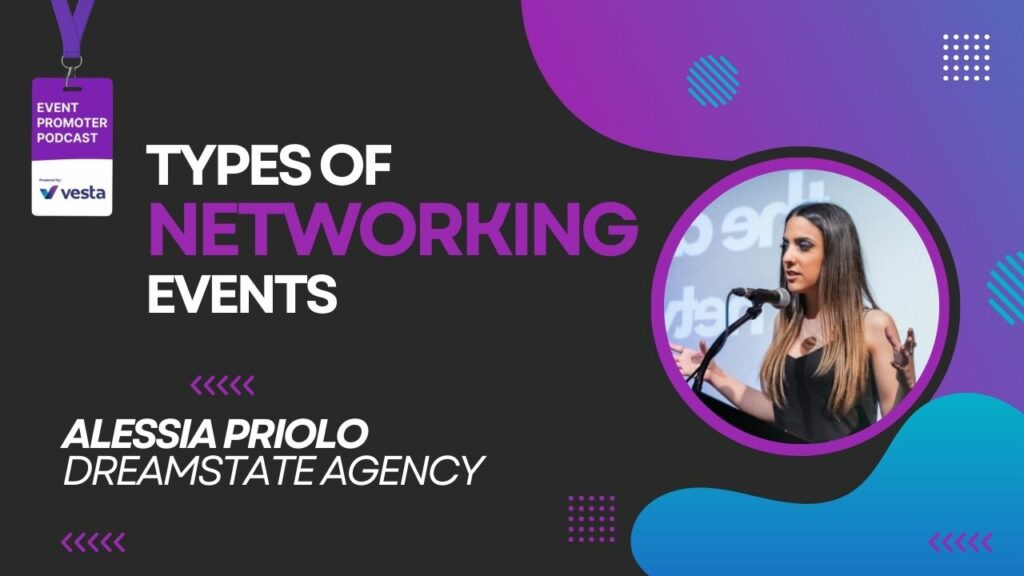Watch on YouTube | Listen on Spotify | Listen on Apple Podcasts
In this episode of the Event Promoter Podcast, we dive deep into the topic of business networking events with Alessia Priolo, founder of Dreamstate Agency and the event organizer behind the Dreampreneur Event.
Alessia is no stranger to innovative event concepts. Previously, she wowed us with her insights on hosting a Metaverse concert, showcasing the potential of virtual production in boosting accessibility to high-quality event experiences online. Now, she’s back to share her expertise on a range of networking events, from traditional trade shows to cutting-edge open coworking sessions.
From Trade Shows to Executive Dinners to Open Coworking, Alessia Priolo covers the value of various types of networking events, offering a fresh perspective on how to leverage each for maximum impact. It got our wheels turning on all the different types of business networking event, so in this comprehensive guide, we’ll explore:
- Our interview with Alessia on types of networking events
- The crucial role of networking in combating entrepreneurial isolation
- How different types of events cater to various networking needs
- Insider tips on making meaningful connections at each event type
- The future of networking events in the age of remote work
Whether you’re a seasoned networker looking to refine your approach or a newcomer trying to navigate the complex world of professional connections, this guide has something for you. Join us as we unpack Alessia’s expert insights and provide you with actionable strategies to supercharge your networking efforts.
If you haven’t already, make sure to check out our 2024 Event Promotion Trends Report that we talk about near the end of the episode.
Types of Networking Events with Alessia Priolo | Event Promoter Podcast Full Video
Types of Business Networking Events: A Comprehensive Guide
With the meteoric rise of remote work over the past few years, a new emphasis is being made on business networking as a crucial aspect of professional growth and success. But with so many different types of networking events available, how do you choose the right one for your goals? In this article, we’ll explore various types of business networking events and provide insights on how to make the most of these opportunities, drawing from expert advice by Alessia Priolo, founder of Dreamstate Agency and the Dreampreneur Event.
The Importance of Business Networking
Before diving into the types of events, let’s quickly recap why networking is so vital:
- It combats the isolation of entrepreneurship
- It creates a supportive community of like-minded professionals
- It opens doors to new opportunities, collaborations, and even funding
- It provides a platform for exchanging ideas and learning from peers
Now, let’s explore the various types of networking events you might encounter:
1. Trade Shows and Conferences
Trade shows and conferences are large-scale events that offer a mix of educational sessions, exhibitions, and networking opportunities. These events often attract professionals from various sectors within an industry, providing a broad perspective on current trends and innovations. While they can be overwhelming due to their size and scope, they offer unparalleled exposure to a wide range of industry professionals.
However, the sheer scale of these events can make it challenging to form deep connections. To maximize your networking potential, focus on attending smaller breakout sessions or evening events within the main conference. These more intimate settings often provide better opportunities for meaningful conversations and relationship-building.
Hosting a conference? Check out this other interview with Erica Bishaf is CEO & Founder of CampfireSocial on building deeper sponsorship engagements for your trade shows and conferences.
Pro Tip: Before attending a trade show or conference, research the agenda and plan your schedule to balance educational sessions with networking opportunities. Don’t forget to bring plenty of business cards and consider preparing a short elevator pitch to introduce yourself effectively.
2. Industry-Specific Events
Industry-specific events bring together professionals from a particular sector, allowing for more focused networking and knowledge sharing. These events are typically smaller than large trade shows and are tailored to address the unique challenges and opportunities within a specific industry.
The advantage of industry-specific events is the high relevance of connections you can make. Attendees often share similar experiences and challenges, making it easier to find common ground and build meaningful relationships. These events may feature expert speakers, panel discussions, or workshops that provide in-depth insights into industry-specific topics.
When attending industry-specific events, come prepared with questions and topics you’d like to discuss with peers. This preparation can help you make the most of the focused networking opportunities and gain valuable insights from others in your field.
3. Small-Scale Networking Sessions
Intimate gatherings, often with 30-40 attendees, can lead to deeper connections and more meaningful conversations. These events might feature a guest speaker or a specific theme, providing a focal point for discussions and relationship-building.
Small-scale networking sessions offer a more relaxed atmosphere compared to larger events, making it easier for introverts or networking novices to participate actively. The limited number of attendees allows for more one-on-one interactions and the opportunity to have in-depth conversations with a higher percentage of participants.
These events often follow a structured format, such as a brief presentation followed by open networking time. This structure helps to break the ice and provides common topics for attendees to discuss. When participating in small-scale networking sessions, aim to connect with a diverse range of professionals and be open to unexpected opportunities that may arise from these connections.
4. Roundtable Discussions
Roundtable discussions are structured events that involve small groups discussing specific topics, fostering in-depth conversations and idea exchanges. These events typically feature a moderator who guides the conversation and ensures that all participants have the opportunity to contribute.
The intimate nature of roundtable discussions allows for a deep dive into complex topics and encourages active participation from all attendees. This format is particularly beneficial for professionals looking to gain insights from peers or industry leaders on specific challenges or trends.
When participating in a roundtable discussion, come prepared with thoughtful questions and be ready to share your own experiences. Active listening is key in these settings, as the value often lies not just in speaking but in absorbing the diverse perspectives shared by other participants.
5. Coworking Meetups
A rising trend in networking, coworking meetups combine productive work time with opportunities to connect with other professionals in a relaxed setting. These events typically take place in shared workspaces or dedicated coworking facilities, attracting a diverse group of professionals from various industries.
The unique aspect of coworking meetups is the balance between individual work and social interaction. Attendees can focus on their own tasks while having the opportunity to engage with others during breaks or designated networking periods. This format is particularly appealing to remote workers, freelancers, and entrepreneurs who may otherwise lack daily interactions with other professionals.
Coworking meetups often foster a sense of community and collaboration. They provide a platform for spontaneous idea-sharing and problem-solving, as well as the potential for forming long-term professional relationships. When attending these events, be open to both giving and receiving advice, and don’t hesitate to share your expertise with others.
6. Curated Dinners
High-end networking events that bring together executives or professionals from specific roles (e.g., CMOs, CEOs) for intimate discussions over dinner. These exclusive gatherings are often invitation-only and aim to facilitate high-level networking and idea exchange in a refined setting.
Curated dinners typically feature a carefully selected guest list to ensure a mix of perspectives and expertise. The relaxed atmosphere of a shared meal helps to break down barriers and encourages more personal conversations than might occur in a traditional business setting.
When attending a curated dinner, come prepared with thoughtful conversation topics and be ready to engage in meaningful discussions. These events often provide unique opportunities to build relationships with industry leaders and decision-makers, so make the most of the intimate setting by actively participating and showing genuine interest in others’ perspectives.
7. Online Events and Webinars
While the definition of these as “true” networking events is debated, online events and webinars can still provide valuable connections when structured to encourage interaction. These virtual gatherings have gained significant popularity, especially in light of recent global events that have limited in-person meetings.
Online events can range from large-scale virtual conferences to smaller, more interactive webinars. Many platforms now offer features like breakout rooms, chat functions, and virtual networking lounges to facilitate connections between attendees. While they may lack the personal touch of face-to-face interactions, online events offer the advantage of connecting with professionals from around the world without the need for travel.
To make the most of online networking events, actively participate in chat discussions, ask questions during Q&A sessions, and follow up with interesting contacts after the event. Many virtual platforms allow you to exchange contact information or connect on social media directly through the event interface, making it easier to maintain new connections.
How to Host a Business Networking Event
If you’re considering organizing your own networking event, here are some key points to keep in mind:
- Define your target audience and event goals
- Choose an appropriate format and venue
- Incorporate interactive elements to encourage connections
- Provide value through speakers, workshops, or curated discussions
- Follow up with attendees to maintain relationships
Planning a successful networking event requires careful consideration of your audience’s needs and preferences. Start by clearly defining who you want to attract and what you hope to achieve with the event. This will guide your decisions on format, venue, and content.
When choosing a format, consider the size of your intended audience and the type of interactions you want to encourage. For smaller groups, a roundtable discussion or curated dinner might be appropriate. For larger audiences, a mix of presentations and structured networking sessions could work well.
Regardless of the format, it’s crucial to incorporate interactive elements that facilitate connections between attendees. This could include icebreaker activities, guided networking sessions, or even a networking app that helps attendees identify and connect with relevant contacts.
Providing value is key to a successful networking event. Consider inviting engaging speakers, organizing workshops on relevant topics, or curating discussions around industry trends. The goal is to ensure that attendees leave with not only new connections but also valuable insights or skills.
Finally, don’t forget the importance of follow-up. After the event, reach out to attendees to gather feedback and maintain the connections formed during the event. Consider creating a LinkedIn group or other online community to keep the networking momentum going long after the event has ended.
Maximizing Your Networking Experience
Regardless of the event type, here are some tips to make the most of your networking opportunities:
- Set clear goals for each event you attend
- Prepare an elevator pitch and some conversation starters
- Listen actively and look for ways to provide value to others
- Follow up with new connections promptly after the event
- Be open to unexpected opportunities and collaborations
Approaching networking events with a clear strategy can significantly enhance your experience and outcomes. Before attending any event, take some time to define what you hope to achieve. Are you looking to meet potential clients, find a mentor, or learn about new industry trends? Having clear goals will help you focus your efforts and make the most of your time.
Preparation is key to successful networking. Craft a concise and engaging elevator pitch that clearly communicates who you are and what you do. Additionally, prepare a few open-ended questions or conversation starters relevant to the event theme or industry. This preparation will help you feel more confident and make it easier to initiate meaningful conversations.
Remember that effective networking is a two-way street. While it’s important to communicate your own value, it’s equally crucial to listen actively and look for ways to help others. By focusing on how you can provide value to your new connections, you’ll build stronger, more mutually beneficial relationships.
Don’t let your networking efforts end when the event does. Follow up with your new connections within 24-48 hours while the interaction is still fresh in both your minds. A simple email or LinkedIn message referencing your conversation and suggesting next steps can go a long way in solidifying the relationship.
Lastly, remain open to unexpected opportunities. Some of the most valuable connections can come from surprising sources, so approach each interaction with an open mind and a willingness to explore new possibilities.
The Future of Networking Events
As the business landscape evolves, so do networking events. Trends to watch include:
- Hybrid events combining in-person and virtual elements
- More niche and targeted networking opportunities
- Increased focus on creating lasting communities beyond single events
- Integration of technology to facilitate connections before, during, and after events
The future of networking events is likely to be characterized by a blend of traditional in-person interactions and innovative digital solutions. Hybrid events, which combine physical and virtual elements, are becoming increasingly popular. These events allow for the personal touch of face-to-face meetings while also leveraging technology to expand reach and facilitate connections across geographical boundaries.
We can expect to see a rise in more niche and targeted networking opportunities. As professionals seek more relevant and focused connections, event organizers are likely to create highly specialized events catering to specific industries, roles, or even particular challenges within a field. These targeted events can provide attendees with more valuable and directly applicable networking experiences.
There’s also a growing recognition that the value of networking extends beyond single events. As a result, we’re likely to see an increased focus on creating lasting communities that continue to provide value and facilitate connections long after an initial event has ended. This might take the form of online forums, regular meetups, or ongoing mentorship programs.
Technology will play an increasingly important role in shaping the future of networking events. From AI-powered matchmaking tools that suggest relevant connections based on attendees’ profiles and interests, to virtual reality platforms that create immersive networking experiences, technology will continue to enhance and streamline the networking process.
By understanding the various types of business networking events available and approaching them strategically, you can significantly expand your professional network and open doors to new opportunities. Whether you’re an entrepreneur, a small business owner, or a corporate professional, there’s a networking event out there that’s perfect for your needs.
Remember, as Alessia Priolo emphasizes, “It does take an army to be successful.” So get out there, connect, and build your professional community!
You can catch the full episode on our YouTube channel or your favorite podcast platform.
Check out some of our other podcasts and resources for event promoters below.



